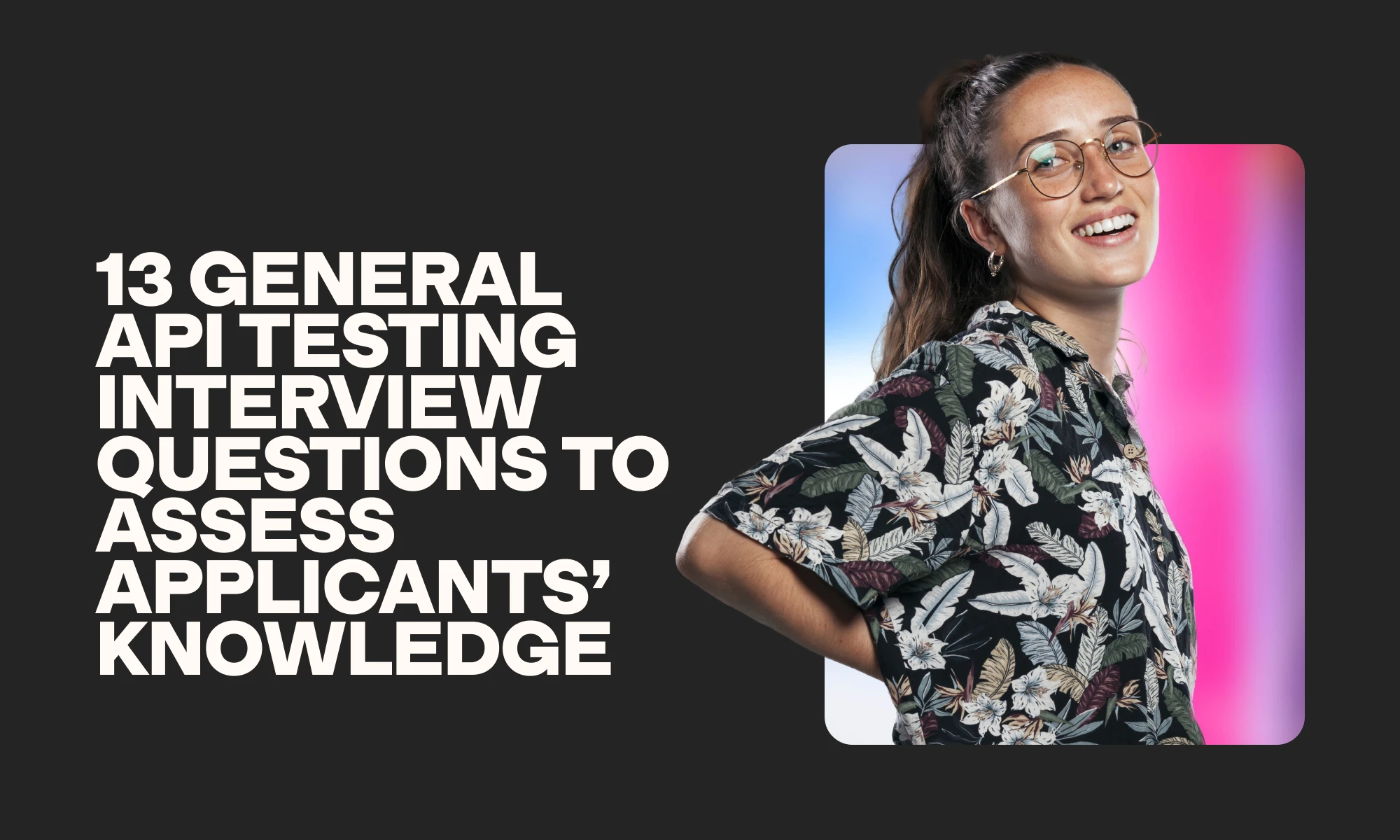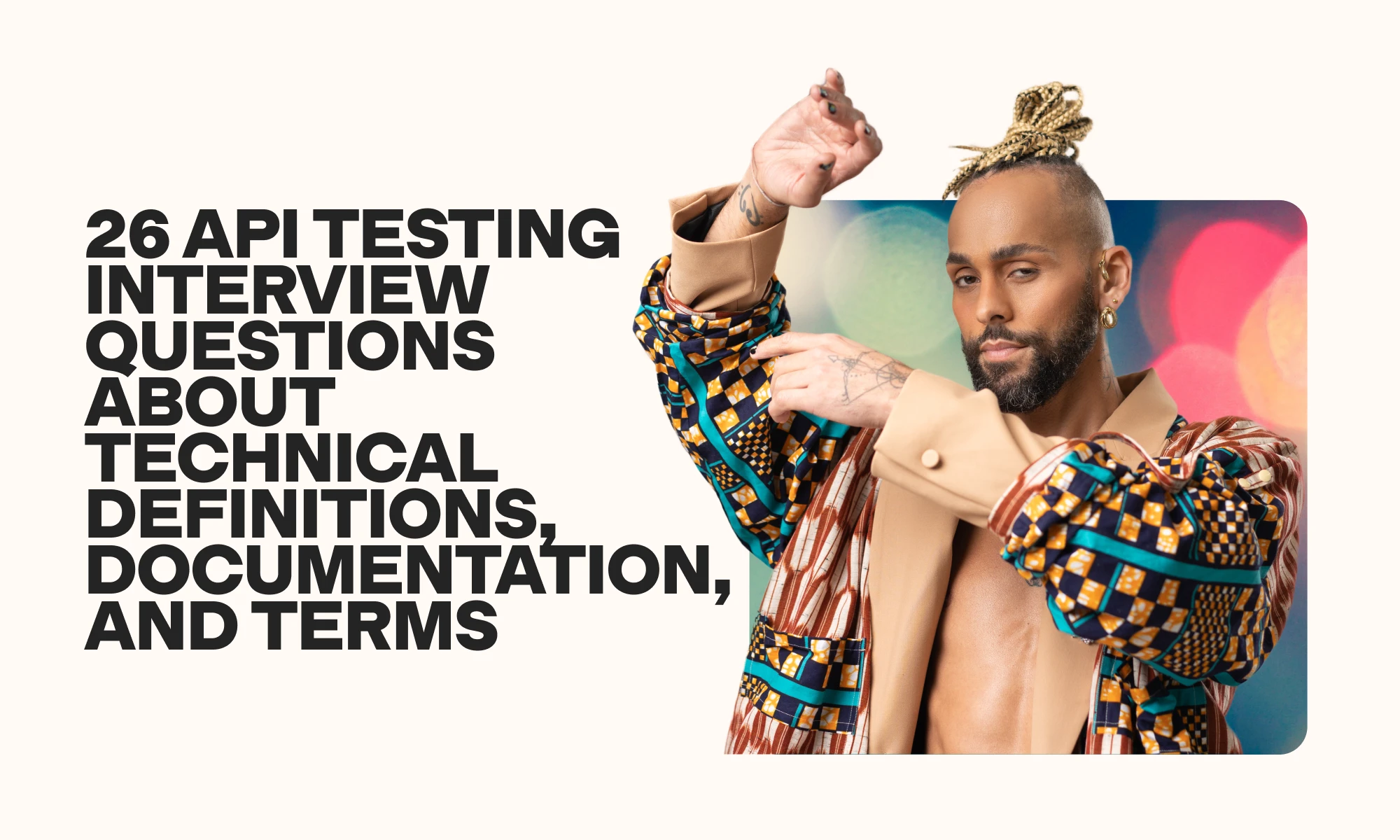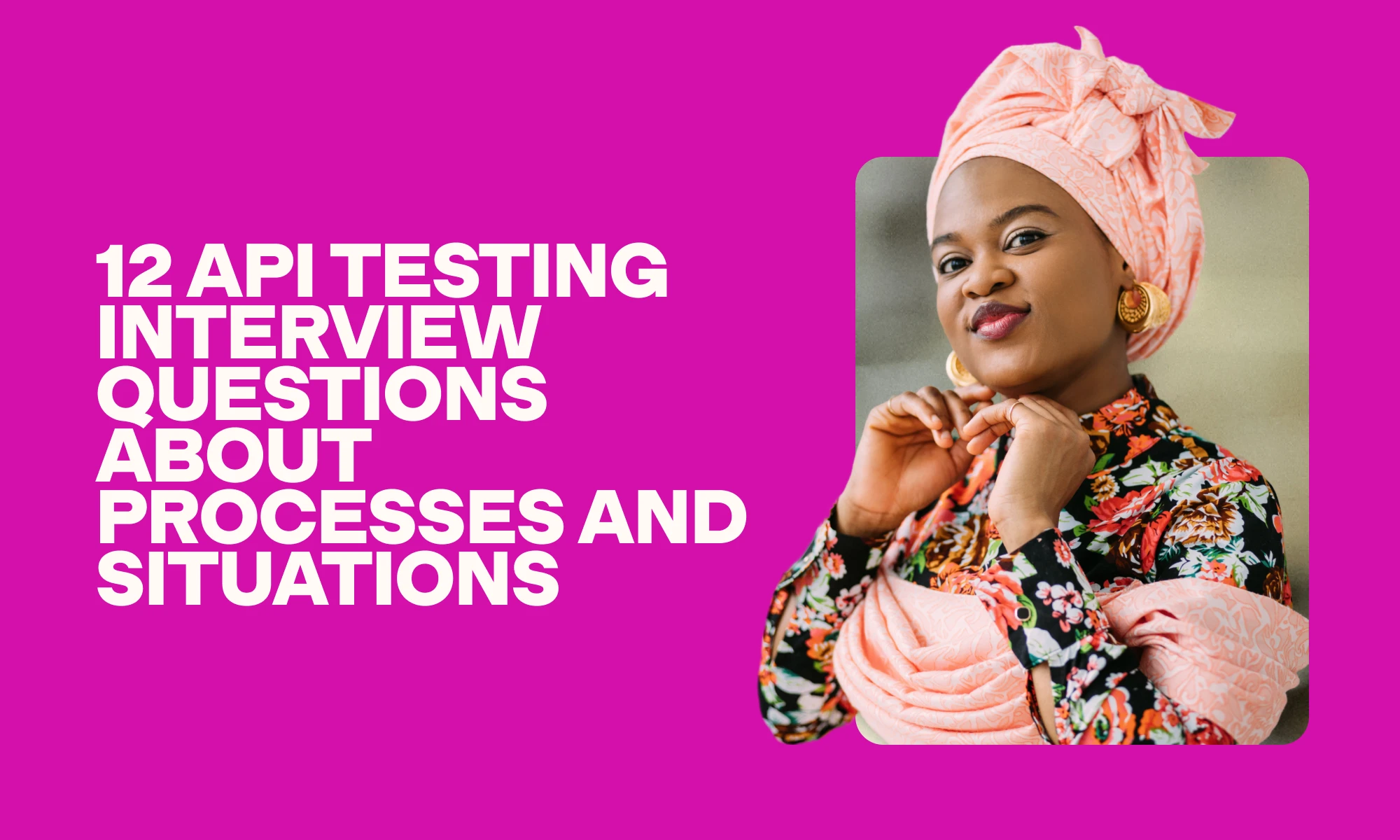51 API testing interview questions to assess testers
There’s no doubt that hiring an expert API tester is a good move for your organization and its team of developers if you need to make sure an application meets your criteria for security, availability, and performance.
A new hire with the right testing skills can help to identify defects in a server or database and complete such tasks with minimal effort.
But how can you know if your API testers have the required API testing skills?
Our advice is simple.
Start with a REST API test to learn if your applicants have the vital skills, and then conduct an interview with some of the 51 API testing interview questions listed in this article.
Now, let’s dive into the questions straight away!
Table of contents
- 13 general API testing interview questions to assess applicants’ knowledge
- 5 general API testing interview questions and answers
- 26 API testing interview questions about technical definitions, documentation, and terms
- 5 API testing interview questions and answers about technical definitions, documentation, and terms
- 12 API testing interview questions about processes and situations
- 5 API testing interview questions and answers about processes and situations
- 5 tips for using API testing interview questions to hire a pro
- Hire talented API testers using these API testing interview questions
13 general API testing interview questions to assess applicants’ knowledge
Ask API testers some of these 13 API testing interview questions to evaluate their skills and knowledge in this area.
Explain what an API is.
Explain how APIs are different from web services.
Explain how API usage can be limited.
Name three common architectural styles testers use to create a web API.
Explain which clients can use web APIs.
Explain what API testing is.
Explain why API testing is important.
Name three protocols that testers use in API testing.
Explain what the test environment is in an API.
Which skills do testers need for API testing?
Which soft skills do testers need to do API testing?
Which skills are you working on as an API tester?
Explain the main types of API testing.
5 general API testing interview questions and answers
Here are five general API testing interview questions from the list above, along with answers you can use to review your candidates’ responses.
1. Which skills do testers need for API testing?
Can your applicants explain that testers need coding and programming language knowledge to complete API testing?
Can they mention some of the programming languages required for API testing, including JavaScript (which you can test with our JavaScript test) or C# (which you can test with our C# test)?
2. Which soft skills do testers need to complete API testing?
Essential soft skills for API testers include excellent communication and critical thinking skills (which you can test with our Communication and Critical Thinking test).
Other important soft skills for API testers include time management skills and attention to detail.
3. Which skills are you working on as an API tester?
Are your applicants interested in improving their skills continuously? This is important for any applicant you hire: Their willingness to learn and grow will translate into a more successful and productive employee.
Some skills they may be working on include coding in different programming languages like Python or problem-solving skills.
4. Explain what API testing is.
Applicants should be able to explain that API testing involves testing to determine whether a developed API (application program interface) matches the expectations related to its functionality. Testers also assess the reliability and performance of the developed application.
5. Explain what an API is.
API stands for “application programming interface”. Applicants should be able to explain that an API acts as an intermediary tool that permits different applications to interact with each other.
The best insights on HR and recruitment, delivered to your inbox.
Biweekly updates. No spam. Unsubscribe any time.
26 API testing interview questions about technical definitions, documentation, and terms
Ask your API tester candidates some of these 26 API testing interview questions about technical definitions, documentation, and terms to evaluate their testing knowledge more thoroughly.
Name some tools that API testers use in their work.
Explain what unit testing is.
Explain how API testing differs from unit testing.
Explain what UI testing is.
Explain how API testing differs from UI testing.
Explain what functional testing means.
Explain what usability and reliability testing means.
Explain what security and penetration testing means.
Explain what automation testing means.
Explain what API documentation testing means.
Name three crucial API errors.
Name some key API documentation templates to simplify API testing.
Explain what REST means.
Explain what RESTful web services are.
Explain what SOAP means.
Explain what resources are in REST.
Name the five components of HTTP requests.
What is the GET method in HTTP? Does REST support this?
What is the POST method in HTTP? Does REST support this?
What is the PUT method in HTTP?
What is the DELETE method in HTTP?
What is the OPTIONS method in HTTP?
What is the HEAD method in HTTP?
What is the difference between PUT and POST?
Explain what URI means.
Explain what a caching mechanism is.
5 API testing interview questions and answers about technical definitions, documentation, and terms
Here are five answers to the most important API testing interview questions about technical definitions, documentation, and terms. Use them to assess applicants’ responses.
1. Name some tools that API testers use in their work.
Seasoned API testers should be able to name a few tools commonly used to complete API testing tasks. Some of the tools they may mention include:
SoapUiPro
Apigee
Applicants should be able to explain how they work, outline some of the advantages of using them for API testing, and provide information on their specific experience with each tool.
2. Explain what unit testing is.
Can your applicants explain that unit testing is a process to confirm that the units can perform as expected in isolation? Do they know that unit testing gets completed by the development team?
3. Explain how API testing differs from unit testing.
Skilled API testers should be aware that API testing aims to assess the entire system’s functionality.
They should also know that API QA testers complete API testing while the development team completes unit testing. In contrast, unit testing aims to verify that the individual units work in isolation.
4. Explain what UI testing is.
Applicants should know that UI testing means user interface testing.
Do they know that UI testing involves testing graphical interfaces and determining how users interact with an application? Can they explain that UI testing focuses on the “look” of an application?
5. Explain how API testing differs from UI testing.
Top talent will know that API testing focuses on testing how communication happens between two software systems and making sure that a software system can execute functions or subroutines when it implements an API.
Alternatively, UI testing focuses on an application’s aesthetics and its “look” in terms of the fonts and layouts used.
12 API testing interview questions about processes and situations
Ask your applicants some of these 12 API testing interview questions about processes to evaluate how they approach complex situations when testing.
Name the main steps required to complete API testing.
Name some of the steps of writing an API document.
In which situation would you use SOAP web services?
Explain how SOAP works.
Explain the top-down approach for SOAP web services.
Explain the bottom-up approach for SOAP web services.
Name five types of bugs that testers may find during API testing.
How would you carry out a discovery testing process?
How would you carry out a usability testing process?
How would you carry out a security testing process?
How would you carry out an automated testing process?
How would you ensure the documentation has sufficient information to interact with the API?
5 API testing interview questions and answers about processes and situations
Here are the answers to five of the API testing interview questions about processes and testing situations. Use these answers to guide you when reviewing your interviewees’ responses.
1. Explain the top-down approach for SOAP web services.
Can your applicants explain that the top-down approach for SOAP web services involves making WSDL documents and establishing a contract between the client and the web service? Do they know that this process is referred to as a contract-first approach?
2. Explain the bottom-up approach for SOAP web services.
Applicants should know that the bottom-up approach for SOAP web services involves writing code before generating a WSDL document. This approach is also referred to as a contract-last approach.
3. In which situation would you use the SOAP web services?
Candidates should know that if a tester is concerned with security and has sufficient resources, they should use SOAP web services. Applicants may give an example of making a web service for permanent gateways and explain that SOAP is required here because high security is critical in this situation.
4. Name some of the steps of writing an API document.
Can your applicants name some of the critical steps of writing an API document? The things they may mention include:
Gathering information the tester requires for all functions in a document
Writing an overview for the API documentation
Including a section for error messages
Including a section for authentication
5. Explain how SOAP works.
Do your candidates know that SOAP works by providing a user interface that client objects can access? Can they also explain that the interface makes files and methods made of server objects?
Applicants should also know that SOAP uses the POST method to send XML to the server. The server then sends the result to the client.
5 tips for using API testing interview questions to hire a pro
We’ve got five handy tips for using API testing interview questions to hire a professional API tester for your team.
Let’s see how you can make the interview process easier.
1. Use our API test first
With our REST API test, you can automatically identify the testers who have the necessary knowledge and skills for your open role. Implement this skills test into the early stages of your hiring process, ideally right after you’ve sourced candidates.
Analyze test results to decide which applicants to interview.
2. Give enough information about the API testing role you’re hiring for
Your applicants will be curious to learn about the role you’re hiring for, so dedicate a part of the interview to informing them about the position, the project, and the team.
3. Begin with general API testing interview questions
When you begin the interview, use some general API testing interview questions first (featured in the first section of this article). Proceed to more technical questions afterward.
4. Use structured interviews when asking API testing interview questions
Structured interviews involve following the same order of questions when conducting interviews – and asking all applicants the same questions. This doesn’t mean you can’t ask extra questions when you want to know more about a candidate’s response, but follow the same order to make reviewing easier and more efficient.
This enables you to record responses on a scorecard or in an internal document and compare candidates easily.
5. Analyze test results and your applicants’ responses
By now, you’ll have plenty of information on each candidate that can help you make a choice.
Analyze candidates’ test scores and interview performance to identify top performers. Discuss results with your hiring team and consider which applicant is the best match for your API testing position.
Hire talented API testers using these API testing interview questions
Even though it’s not always easy to hire API testers at the top of their career, you can simplify the process.
Consider using our REST API test to assess applicants’ skills, and then come back to this list of API testing interview questions to prepare for the interview process.
With these two approaches, you can’t go wrong!
You’ll be able to hire an API tester for your organization with ease. Use our API testing interview questions and check out all the skills tests we offer to build an objective, bias-free hiring process. Sign up for a TestGorilla free plan.
You've scrolled this far
Why not try TestGorilla for free, and see what happens when you put skills first.

















